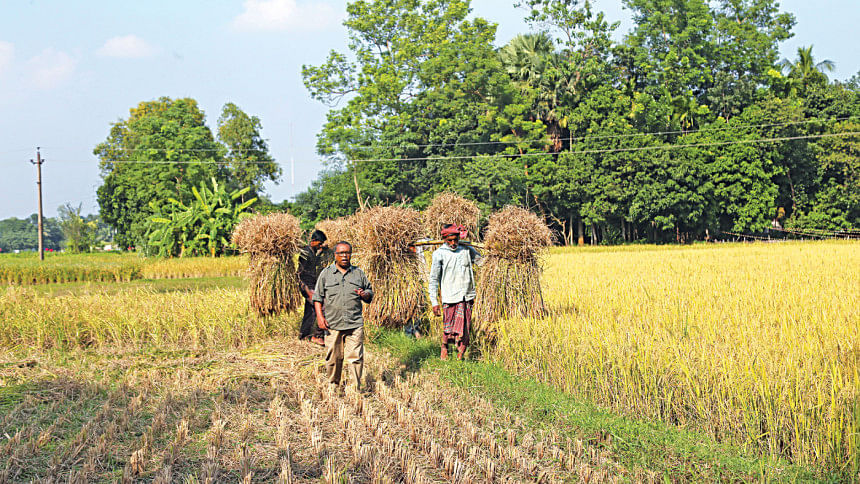Farming must go on as survival strategy

The number of COVID-19 affected people in Bangladesh is increasing every day. Everything seems to have gone away of control. Recently, many shops were opened for Eid-ul-Fitr and thus it is quite alarming that the spread of the virus will be even more. We saw even children were accompanying their parents in this shopping spree, although many shopping malls had decided that they won't open their shops during this crisis. I really salute them from the bottom of my heart. But the rest…why they did this, I don't know. And we the customers, couldn't we celebrate one Eid without new cloths and gifts for our dear ones? We could have easily supported the people, especially the farmers who are fighting hard to ensure our food security in this terrible time, in need with our Eid shopping budget.
Coronavirus has been ruling the world for the past five months. Bangladesh is today on its 83rd day and also well aggressive in both affected and death rate which is going fast every minute. I can understand that people are frustrated, agitated, tired and feeling hopeless. For how long this evil is going to play with us? The challenge is a diversified one: on one hand, the number of affected people and deaths has to fall down; on the other hand, the world needs to find an effective way to gear up the economy. So that people get food, the farmers can live and the marginal people can survive. No matter rich or poor, all the countries have the same headache. Many countries have already stepped down from the strict lockdown measures. Since people are coming out from their safe zones, and the disease is still uncontrollable due to the unavailability of the proven vaccine, the spread of the virus is still at large. Public health around the world is at stake and nothing has changed in the past five months.
Food and Agriculture Organization of the United Nation's sent me a press release recently which says while analyzing data of food supply since 1995, linked to FAO's statistical development of the prevalence of undernourishment (PoU) indicator, and correlating them to past local economic trends in countries that are net food importers, they found that millions of people are likely to join the ranks of the hungry as a result of the COVID-19-triggered recession. That number will vary according to the severity of GDP growth contractions. In January, the International Monetary Fund anticipated global GDP would expand by 3.3 percent but in April, when much of the world was shutting down to contain contagion, it issued a new forecast of minus 3 percent. Many countries will experience sharp and painful economic shocks. FAO added further in the press release, governments are rolling out unprecedented fiscal and monetary stimulus packages to prop up their economies. By taking these measures, they are maximizing the chances of a relatively quick economic bounce back. If farmers, for example, are supported so that they can hold on to their assets throughout this crisis, they will be in a much better position to keep on providing for their families, communities, and towards national food security.
The most hopeful message for us is we could produce Boro rice quite substantially. We could also harvest paddies at the haor regions of the country. An agriculture ministry press note quoted that hundred percent paddies were harvested at the haor areas. The countrywide harvest of Boro is almost done except the field damages, caused by Cyclone Amphan. FAO recognizes and applauds the Government of Bangladesh for its agricultural and wider economic initiatives in response to the crisis and for its recognition of the crucial importance of the agricultural sector in ensuring food security.
To stop the pandemic, we must address the health sector above everything else. Then, we should prioritize the food security, healthy and nutritious food for everyone. If the poor people, now suffering from malnutrition, are put under a safety net where they will be given food and good health support, this will really help them to stand back again and fight against the pandemic.
When Bangladesh is struggling to fight against the deadly coronavirus pandemic, another catastrophe, the extremely severe cyclonic storm Amphan swept through the country. Definitely the cyclone has intensified sufferings of low income group people living in the vulnerable areas. It left behind a trail of destruction in the country's coastal areas, affecting more than a million people in nine districts of Khulna and Barishal divisions. The standing crops, vegetables and fruits on 1.76 lakh hectares of land were destroyed. It also damaged fish farms. According to a primary estimate, the cyclone caused damages worth around Tk 1,100 crore. The cyclone hit a total of 26 districts. Over 10,000 shrimp enclosures were washed away in Satkhira, Bagerhat and Khulna. The cyclone also caused massive damage in Satkhira mango orchards. Out of 4,000 hectares of mango cultivation in Satkhira, 3,000 hectares have been severely damaged which is 60 to 70 percent of total cultivation in the district, Agriculture Minister Dr Abdur Razzaque said in an online press briefing. He added 10 percent in Boro, 5 percent in maize cultivation, 15 percent in vegetable, 20 percent in peanut, 20 percent in sesame, 10 percent in mango, 5 percent in litchi, 10 percent in banana, 50 percent in papaya, 30 percent in chili, 50 percent in soybean and mung dal faced loss while the Aus paddy was slightly damaged.
For your kind notice, on May 1, Bangladesh Railway launched special parcel trains on three routes to ensure smooth supply of agricultural goods, vegetables, food, and perishable goods during the Covid-19 pandemic. However, due to poor response from traders railway authorities have suspended the operation of special parcel trains for agricultural goods on the Chittagong-Dhaka route just three days after its inauguration. Farmers are still unaware of the whole system of it. Additionally on May 9, the railway authorities launched special parcel train on several rail routes for the convenience of traders to transport essentials as well as vegetables, eggs and fish for the convenience of traders at the directive of the Honourable Prime Minister Sheikh Hasina. Railways Minister Nurul Islam Sujan told me over a Skype conference that Bangladesh Railway has taken the initiative to launch these special parcel trains to transport vegetables, food grains and other perishable items produced by farmers amid lockdown due to the coronavirus pandemic.

Dear readers, we don't know or can tell when the coronavirus will leave our country or even the world. And when will we can really come back to normal life. We have seen it has been a baffling decision-making time for the researchers and policymakers. What I understand is we must face this difficult time and survive with our utmost intelligence. We must keep the production going on. Meanwhile, government has started distributing agricultural inputs to help next season's productions. The prime minister has stressed not to keep an inch of land uncultivated. Additionally, I believe the people who were hit hard by the cyclone- be it their lives or assets or crops, government will surely bring out an effective mechanism to support them at this very precarious time. Otherwise, these people will be shattered and the communities there would face severe aftermath. And, we must protect the Sundarbans as it always has protected us. Wherever you are, whether in the villages or in the cities, you all must take agricultural ventures, be it really small, to significantly survive. Your venture can save all of us and the entire nation. Belated and happy Eid-ul-Fitr greetings to all the farmers as well as every citizens of the country. Stay safe and stay strong.

 For all latest news, follow The Daily Star's Google News channel.
For all latest news, follow The Daily Star's Google News channel. 



Comments